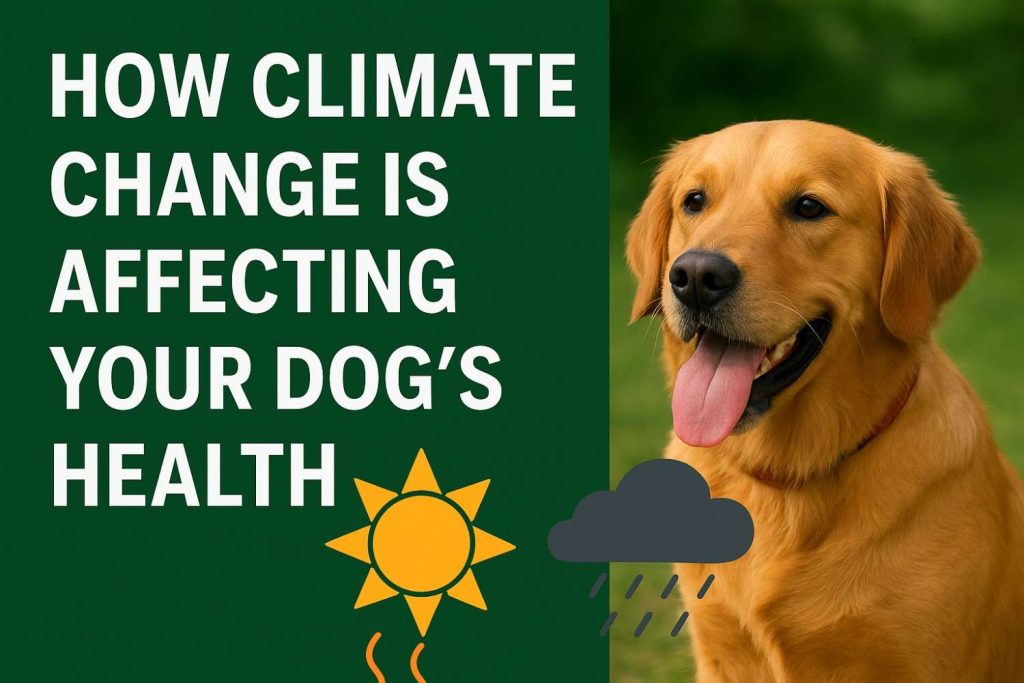🌍 Introduction: Why Climate Change Matters for Dogs
Climate change isn’t just about melting ice caps or rising sea levels — it’s also changing how our pets live. Dogs are especially sensitive to heat, pollution, and seasonal changes. Because of this, they now face new health challenges that many pet owners never imagined.
As a responsible dog parent in 2026, it’s important to know how global warming affects your furry friend’s health. Let’s explore what’s changing, what symptoms to watch for, and how you can protect your dog from these emerging risks.

☀️ 1. Rising Temperatures and Heat Stress
Dogs don’t sweat like humans. Instead, they cool down mostly through panting and a few sweat glands on their paws. As global temperatures rise each year, this natural cooling system often isn’t enough. Consequently, dogs are now more likely to suffer from heat exhaustion or heatstroke.
🔥 Signs of Heat Stress in Dogs
-
Heavy panting or drooling
-
Tiredness or confusion
-
Vomiting or unsteady walking
-
Collapsing or fainting
🐾 Dogs Most at Risk
Flat-faced breeds such as Pugs, Bulldogs, and Shih Tzus struggle more in hot weather because of their shorter airways. Similarly, older dogs and those with higher body weight may find it harder to regulate temperature.
🌡️ Prevention Tips
-
Walk your dog early in the morning or late evening
-
Always provide shade and fresh, cool water
-
Use cooling mats or vests during hot days
-
Never leave your dog in a parked car — even for a few minutes
These small steps can make a big difference during summer months.
🌫️ 2. Air Pollution and Breathing Problems
Because climate change increases wildfires and industrial smog, the air quality in many regions has worsened. As a result, dogs are breathing in more harmful particles than ever before.
🧬 How Poor Air Quality Affects Dogs
Since dogs breathe closer to the ground and often faster than humans, they absorb more pollutants into their lungs. Over time, this exposure can lead to:
-
Persistent coughing
-
Nasal discharge
-
Wheezing or shortness of breath
-
Increased risk of respiratory infections
🩺 How to Keep Your Dog’s Lungs Healthy
-
Check the Air Quality Index (AQI) before outdoor walks
-
Keep windows closed on smoky or dusty days
-
Use an air purifier indoors
-
Wipe your dog’s paws and fur after walks to remove residue
By maintaining clean air indoors, you can help your dog breathe easier.
🦠 3. Ticks, Fleas, and Mosquitoes Are Spreading
Warmer winters mean that parasites like ticks, fleas, and mosquitoes now survive all year long. Because of this, vector-borne diseases are spreading to new areas.
🕷️ Common Diseases Linked to Climate Change
-
Lyme Disease (carried by ticks)
-
Heartworm (transmitted by mosquitoes)
-
Ehrlichiosis and Leishmaniasis (emerging in warmer regions)
💡 How to Protect Your Dog
-
Use vet-approved tick and flea prevention year-round
-
Keep your lawn trimmed and clean
-
Check your dog’s ears, neck, and paws after walks
-
Ask your vet about heartworm prevention options
Being consistent with prevention is the best way to stop these parasites from harming your dog.
🌾 4. Allergies and Skin Irritations
Climate change has also lengthened pollen seasons. Furthermore, rising humidity increases mold and dust levels — making skin allergies more common in dogs.
🐶 Common Allergy Symptoms
-
Itchy or red skin
-
Constant licking or scratching
-
Hair loss or “hot spots”
-
Frequent ear infections
🌱 How to Manage Dog Allergies
-
Wipe your dog’s paws after outdoor walks
-
Bathe with gentle, hypoallergenic shampoo
-
Add omega-3 fatty acids to support skin health
-
Discuss allergy medication or shots with your vet
With a few regular habits, you can help your dog feel more comfortable year-round.
💧 5. Water Quality and Hydration
Extreme weather, flooding, and droughts can lead to poor water quality. Stagnant or contaminated water may carry harmful bacteria such as Leptospira, which causes Leptospirosis — a serious infection that affects the liver and kidneys.
🚰 Safe Water Tips for Dogs
-
Provide clean, filtered water daily
-
Wash water bowls with soap regularly
-
Prevent your dog from drinking from puddles, ponds, or streams
-
Ask your vet about Leptospirosis vaccination
Good hydration not only prevents heat stress but also supports digestion and kidney function.
❄️ 6. Unpredictable Weather and Anxiety
Storms, floods, and sudden temperature shifts are becoming more common. These unpredictable weather events often make dogs anxious or fearful.
⚡ Signs of Weather Anxiety
-
Hiding or shaking during storms
-
Barking or pacing nervously
-
Refusing food or attention
-
Destructive behavior when left alone
🧘 How to Reduce Weather-Related Stress
-
Create a quiet, cozy space indoors
-
Play soft music or use a white-noise machine
-
Keep routines consistent to build security
-
Try pheromone diffusers or calming treats (ask your vet first)
A calm environment helps dogs feel safe even during unpredictable weather.
🥗 7. Changes in Appetite and Energy Levels
As temperatures shift, some dogs experience changes in their appetite and metabolism. They may eat less during very hot months and more in cooler seasons.
🍽️ Feeding Tips for a Changing Climate
-
Offer light, balanced meals in warm weather
-
Keep track of your dog’s hydration by adding water or broth to meals
-
Include antioxidant-rich ingredients like blueberries or spinach
-
Maintain a consistent feeding schedule for better digestion
When in doubt, consult your vet to adjust your dog’s diet based on activity level and climate.
🌎 8. Sustainable Pet Care for the Future
Climate change affects all living beings, but small actions can create a big impact. By adopting eco-friendly pet care habits, you can help your dog and the planet at the same time.
🌿 Simple Ways to Be an Eco-Conscious Dog Parent
-
Use biodegradable poop bags
-
Choose toys made from recycled or natural materials
-
Walk to nearby parks instead of driving
-
Support sustainable pet food brands
Every responsible choice contributes to a healthier environment for both humans and pets.
❤️ Conclusion: Caring for Dogs in a Changing World
Climate change is reshaping the world we share with our pets. Dogs now face heat stress, pollution, parasites, and emotional challenges that didn’t exist before. Yet, the good news is that awareness leads to action.
By monitoring weather conditions, improving daily care, and staying proactive with vet checkups, you can protect your dog’s health for years to come.
Your love and attention are the best defenses against the effects of climate change — helping your furry friend stay safe, strong, and happy in 2026 and beyond.



